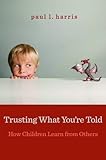Trusting what you're told : how children learn from others / Paul L. Harris.
Material type: TextPublication details: Cambridge, Mass. : Belknap Press of Harvard University Press, (c)2012.Description: 1 online resource (253 pages) : illustrationsContent type:
TextPublication details: Cambridge, Mass. : Belknap Press of Harvard University Press, (c)2012.Description: 1 online resource (253 pages) : illustrationsContent type: - text
- computer
- online resource
- 9780674065192
- Trusting what you are told
- How children learn from others
- BF318 .T787 2012
- COPYRIGHT NOT covered - Click this link to request copyright permission: https://lib.ciu.edu/copyright-request-form
| Item type | Current library | Collection | Call number | URL | Status | Date due | Barcode | |
|---|---|---|---|---|---|---|---|---|
 Online Book (LOGIN USING YOUR MY CIU LOGIN AND PASSWORD)
Online Book (LOGIN USING YOUR MY CIU LOGIN AND PASSWORD)
|
G. Allen Fleece Library ONLINE | Non-fiction | BF318 (Browse shelf(Opens below)) | Link to resource | Available | ocn835374467 |
Includes bibliographies and index.
Early learning from testimony -- Children's questions -- Learning from a demonstration -- Moroccan birds and twisted tubes -- Trusting those you know? -- Consensus and dissent -- Moral judgment and testimony -- Knowing what is real -- Death and the afterlife -- Magic and miracles -- Going native.
If children were little scientists who learn best through firsthand observations and mini-experiments, as conventional wisdom holds, how would a child discover that the earth is round- never mind conceive of heaven as a place someone might go after death? Overturning both cognitive and commonplace theories about how children learn, Trusting What Youre Told begins by reminding us of a basic truth: Most of what we know we learned from others. Children recognize early on that other people are an excellent source of information. And so they ask questions. But youngsters are also remarkably discriminating as they weigh the responses they elicit. And how much they trust what they are told has a lot to do with their assessment of its source. This book opens a window into the moral reasoning of elementary school vegetarians, the preschoolers ability to distinguish historical narrative from fiction, and the six-year-olds nuanced stance toward magic: skeptical, while still open to miracles. Paul Harris shares striking cross-cultural findings, too, such as that children in religious communities in rural Central America resemble Bostonian children in being more confident about the existence of germs and oxygen than they are about souls and God. We are biologically designed to learn from one another, Harris demonstrates, and this greediness for explanation marks a key difference between human beings and our primate cousins. Even Kanzi, a genius among bonobos, never uses his keyboard to ask for information: he only asks for treats. --
COPYRIGHT NOT covered - Click this link to request copyright permission:
There are no comments on this title.
